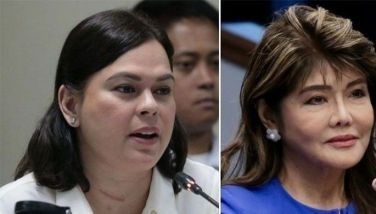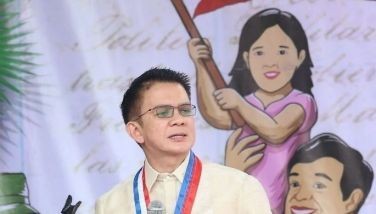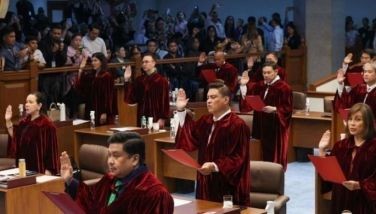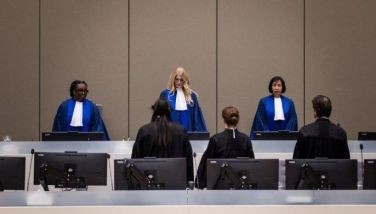Pick a young president in ’04 - FVR
January 17, 2003 | 12:00am
Filipinos should take cues from Britain and China and elect a "young" leader in the 2004 presidential elections, former President Fidel Ramos said yesterday.
The 73-year-old retired general who, like President Arroyo, said he was begging off from the 2004 race, said, "Our generation, which is the generation of post-World War II soldiers, should really be giving way now to the next generation."
Ramos, who was president from 1992 to 1998, cited the leadership transition in China where the "third generation of leaders after Mao Tse-tung has given way to the fourth generation."
"In this country of ours, with 80 million people, I’m sure there are enough young leaders who can pick up the responsibility," he said.
Ramos said at least five people possibly interested in the presidency had approached him for support, but he was non-committal.
In a related development, Malacañang denied reports that Mrs. Arroyo might end up supporting former education secretary Raul Roco because of lack of winnable candidates from the administration.
Presidential Spokesman Ignacio Bunye said Mrs. Arroyo has vowed to remain non-committal and focus on the economy in the remaining 18 months of her administration.
"Our President is really observing a non-political stand and she does not want us to be distracted from our actions to push for the country’s progress," Bunye said.
"She thinks that engaging in partisan politics at this time will only delay our reform agenda so that’s (alleged Roco endorsement) nonsense, baseless and could have been made up," he said.
Earlier reports said Mrs. Arroyo would endorse Roco since he has consistently topped surveys of presidential wannabes.
Palace officials said it might be too late for Malacañang to build up a winnable candidate for the 2004 polls.
Ramos, for his part, said any speculations as to who would be the administration candidate "would be too early and counter-productive."
Mrs. Arroyo had earlier said she will name her "anointed one" in December.
Mrs. Arroyo, elected as vice president in May 1998, took power in a military-backed popular revolt that ousted Joseph Estrada in January 2001.
Estrada has been in custody and facing trial before the Sandiganbayan on plunder charges.
Mrs. Arroyo announced last month that she would not seek a full six-year term in May 2004 and focus on her economic reform agenda and heal political rifts in the last 18 months of her administration.
Ramos said he favored amending the Constitution to allow for a run-off vote should not one candidate earn at least 50 percent of the vote.
Ramos noted he won just 23 percent of the direct vote, essentially a popularity contest, in 1992 and even Estrada got only 40 percent despite a six million-plus winning margin in 1998.
He proposed holding a "run-off" election between two leading presidential contenders.
This is necessary since there is never a majority winner because of the large number of candidates vying for the same post.
Under the run-off system, which is practiced in several countries, the two leading vote-getters in the initial election would square off in another election a month later in order to come up with a winner by majority.
Ramos said similar proposals have been submitted to Congress in the past.
"Since 15 years ago, in spite of some proposals, no such law has been enacted. Why? Because this would hurt the interest of those in Congress," he said.
Ramos also proposed that a provision against turncoatism should be included in the Constitution.
He cited numerous occasions where officials jump ship from one party to another whenever they see fit.
He said this has apparently caused numerous coup attempts in the Senate.
Ramos also proposed conducting regional elections in the Senate.
He noted the imbalance of representation particularly in the Autonomous Region for Muslim Mindanao which represents a fourth of the country’s population.
"That is important. If this is a representative government, a democracy, then everybody must be represented," Ramos said.
He noted that the debate on the form of government has been going on since 1993 between Sen. Edgardo Angara and Speaker Jose de Venecia but it never took off because they were busy tackling administration bills. - AFP, Paolo Romero, Marvin Sy
The 73-year-old retired general who, like President Arroyo, said he was begging off from the 2004 race, said, "Our generation, which is the generation of post-World War II soldiers, should really be giving way now to the next generation."
Ramos, who was president from 1992 to 1998, cited the leadership transition in China where the "third generation of leaders after Mao Tse-tung has given way to the fourth generation."
"In this country of ours, with 80 million people, I’m sure there are enough young leaders who can pick up the responsibility," he said.
Ramos said at least five people possibly interested in the presidency had approached him for support, but he was non-committal.
In a related development, Malacañang denied reports that Mrs. Arroyo might end up supporting former education secretary Raul Roco because of lack of winnable candidates from the administration.
Presidential Spokesman Ignacio Bunye said Mrs. Arroyo has vowed to remain non-committal and focus on the economy in the remaining 18 months of her administration.
"Our President is really observing a non-political stand and she does not want us to be distracted from our actions to push for the country’s progress," Bunye said.
"She thinks that engaging in partisan politics at this time will only delay our reform agenda so that’s (alleged Roco endorsement) nonsense, baseless and could have been made up," he said.
Earlier reports said Mrs. Arroyo would endorse Roco since he has consistently topped surveys of presidential wannabes.
Palace officials said it might be too late for Malacañang to build up a winnable candidate for the 2004 polls.
Ramos, for his part, said any speculations as to who would be the administration candidate "would be too early and counter-productive."
Mrs. Arroyo had earlier said she will name her "anointed one" in December.
Mrs. Arroyo, elected as vice president in May 1998, took power in a military-backed popular revolt that ousted Joseph Estrada in January 2001.
Estrada has been in custody and facing trial before the Sandiganbayan on plunder charges.
Mrs. Arroyo announced last month that she would not seek a full six-year term in May 2004 and focus on her economic reform agenda and heal political rifts in the last 18 months of her administration.
Ramos said he favored amending the Constitution to allow for a run-off vote should not one candidate earn at least 50 percent of the vote.
Ramos noted he won just 23 percent of the direct vote, essentially a popularity contest, in 1992 and even Estrada got only 40 percent despite a six million-plus winning margin in 1998.
He proposed holding a "run-off" election between two leading presidential contenders.
This is necessary since there is never a majority winner because of the large number of candidates vying for the same post.
Under the run-off system, which is practiced in several countries, the two leading vote-getters in the initial election would square off in another election a month later in order to come up with a winner by majority.
Ramos said similar proposals have been submitted to Congress in the past.
"Since 15 years ago, in spite of some proposals, no such law has been enacted. Why? Because this would hurt the interest of those in Congress," he said.
Ramos also proposed that a provision against turncoatism should be included in the Constitution.
He cited numerous occasions where officials jump ship from one party to another whenever they see fit.
He said this has apparently caused numerous coup attempts in the Senate.
Ramos also proposed conducting regional elections in the Senate.
He noted the imbalance of representation particularly in the Autonomous Region for Muslim Mindanao which represents a fourth of the country’s population.
"That is important. If this is a representative government, a democracy, then everybody must be represented," Ramos said.
He noted that the debate on the form of government has been going on since 1993 between Sen. Edgardo Angara and Speaker Jose de Venecia but it never took off because they were busy tackling administration bills. - AFP, Paolo Romero, Marvin Sy
BrandSpace Articles
<
>
- Latest
- Trending
Trending
Latest
Trending
Latest
Recommended

































